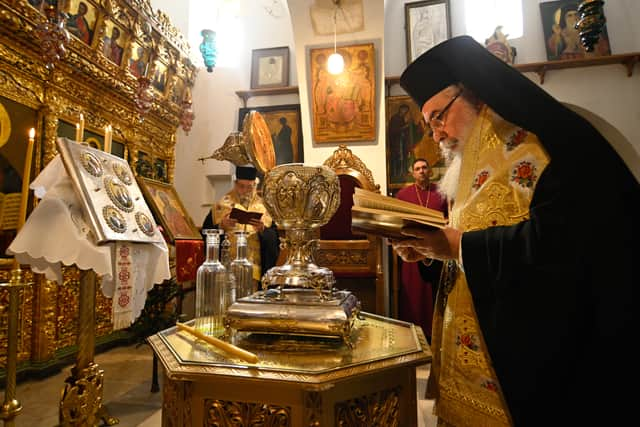Anointment meaning: what is being anointed, is it religious - what will happen to Charles during ceremony?
and live on Freeview channel 276
The coronation of King Charles III is a momentous event, steeped in history and tradition, and is set to take place in Westminster Abbey on 6 May.
Central to the coronation ceremony is the anointing of the monarch with holy oil, a ritual that dates back over a thousand years and is imbued with deep symbolic and religious significance. Camilla will also be anointed with holy oil and crowned, just like the Queen Mother was when she was crowned Queen in 1937.
Advertisement
Hide AdAdvertisement
Hide AdBut what is the historical significance of the anointing ceremony, how it will be performed during the upcoming coronation of King Charles III, and what exactly does it all mean. Here is everything you need to know about it.
What does it mean to be anointed?
To be anointed means to be chosen or appointed for a specific purpose, often in a religious or ceremonial context.
The term comes from the practice of anointing with oil, which was a common ritual in ancient times. In religious contexts, anointing can be seen as a symbol of being blessed or chosen by a higher power for a particular role or mission.
It can also refer to the act of being consecrated or set apart for a sacred purpose. In a broader sense, being anointed can refer to being recognized or chosen for an important role or achievement, even outside of a religious context.


What does it mean within the coronation?
Advertisement
Hide AdAdvertisement
Hide AdBeing anointed with oil has different meanings depending on the context in which it is performed. But within the context of a royal coronation in Britain, it is a symbolic act that represents the bestowal of divine authority and blessing upon the monarch.
The tradition of anointing with oil during British coronation ceremonies can be traced back over a thousand years, to the coronation of King Edgar in 973 AD. The anointing ceremony itself is based on the biblical account of the anointing of King David, and is deeply rooted in Christian tradition.
The anointing is typically performed using a specially-prepared mixture of oil and balsam, known as the “holy oil”, and the monarch is anointed on the head, breast and hands while a prayer is recited asking for the monarch to be granted wisdom, grace and strength to rule justly and uphold the faith.
The links between the royal family and the Church of England go back to the 16th century, when King Henry VIII broke away from the Roman Catholic Church and established the Church of England as the national church.
Advertisement
Hide AdAdvertisement
Hide AdSince then, the monarch has served as the head of the Church of England, and the coronation ceremony reflects this role, with the Archbishop of Canterbury playing a central role in the anointing and crowning of the monarch.
This anointing ceremony is one of the most sacred and symbolic parts of the coronation ritual, and represents the belief that the monarch’s authority is derived from God. By anointing the monarch with oil, it is believed that they are consecrated and set apart for their role as ruler, and are blessed with the power and grace to fulfil their duties.
What oil will be used?
The chrism oil which will be used to anoint the King during his Coronation is vegan friendly. It was made with olives and perfumed with sesame, rose, jasmine, cinnamon, neroli, benzoin, and amber, as well as orange blossom, and will not use any ingredients from animals.
Some of the ingredients used in the holy oil to anoint Charles’ mother, the late Queen, in 1953, came from a musk deer, a civet cat and a sperm whale, Dr John Hall, a retired priest of the Church of England, said in a BBC documentary in 2018.
Advertisement
Hide AdAdvertisement
Hide AdThe holy oil, which will be used to anoint Charles on 6 May, was consecrated in Jerusalem on Friday 3 March at a ceremony in The Church of the Holy Sepulchre led by the Patriarch of Jerusalem, His Beatitude Patriarch Theophilos III, and the Anglican Archbishop in Jerusalem, The Most Reverend Hosam Naoum.
Is anointing religious?
Within the context of the coronation, the anointment of the new monarch is certainly a religious aspect of the ceremony, a significant symbolic act that reflects the long-standing tradition of monarchs being chosen and blessed by a higher power to rule the nation.
The anointing of a new monarch is so sacred it takes place under a canopy, transforming the moment into a deeply personal experience between the sovereign and God. But throughout the world, anointment is not exclusively a religious practice, and in fact can be a secular practice that is used in a variety of contexts.
For example, anointing with oil has been used in certain cultures as a form of traditional medicine or as a way to promote physical or spiritual healing. In some cases, it may be performed by a shaman, healer, or other traditional practitioner, and may involve the use of herbs or other substances in addition to the oil.
Advertisement
Hide AdAdvertisement
Hide AdAnointing can also be used in secular contexts to mark a significant occasion or to recognize a particular achievement. For example, an athlete who sets a new world record may be anointed with oil by a coach or other team member as a sign of respect and achievement.
Similarly, a scholar who is awarded a prestigious academic prize may be anointed with oil as a symbol of their accomplishment.
Comment Guidelines
National World encourages reader discussion on our stories. User feedback, insights and back-and-forth exchanges add a rich layer of context to reporting. Please review our Community Guidelines before commenting.
